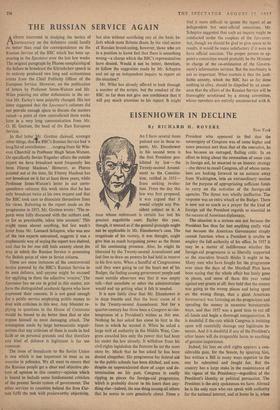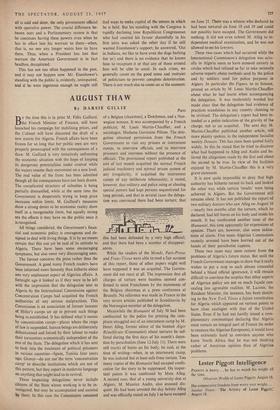EISENHOWER IN DECLINE
By RICHARD H. ROVERE New York As I have several times pointed out in these re- ports, Mr. Eisenhower in his second term is the first President pro- hibited by law — the Twenty-second Amend- ment to the Constitu- tion, ratified in 1951— from seeking re-elec- tion. From the day this law was first proposed, it was argued that it would cripple any Pre- sident subject to it. A is certain has lost his greatest negotiable asset. Earlier this year, though, it seemed as if the general principle might not be applicable in Mr. Eisenhower's case. The magnitude of his victory, it was thought, might give him as much bargaining power as the threat of his continuing presence. Also, he might be liberated by the Twenty-second Amendment and feel free to draw on powers he had held in reserve in his first term. When a handful of Congressmen said they were going to cut the heart out of his Budget, the feeling among government people and most outside observers was that it was empty talk—that somehow or other the administration would end up getting what it felt it needed.
It is now fairly clear that Mr. Eisenhower is in deep trouble and that the basic cause of it is the Twenty-second Amendment. Not for a quarter-century has there been a Congress as con- temptuous of a President's wishes as this one. Nothing he has asked has come to hint in the form in which he wanted it. When he asked a large writ of authority in the Middle West, Con- gress awarded him only the power that had been his under the law already. It withdrew from his civil-rights legislation the features he set the most store by. Much that he has asked he has been denied altogether. His programme for federal aid to the public schools has been ditched, and now, despite an unprecedented show of anger and de- termination on his part, Congress is coolly ripping to pieces the foreign-aid programme, which is probably dearer to his heart than any- thing else—indeed, the one thing among all others that he seems to care genuinely about. From a man whose retirement President who appeared to feel that the sovereignty of Congress was of some higher and more precious sort than that of the executive, he has become an outraged, flailing critic. In an effort to bring about the restoration of some cuts in foreign aid, he resorted to an historic strategy —the threat to recall Congress, all of whose mem- bers are looking forward to an autumn away from Washington, into an extraordinary session for the purpose of appropriating sufficient funds to carry on the activities of the foreign-aid agencies. The threat was wholly ineffective. The response was an extra whack at the Budget. There is now not so much as a prayer for the kind of foreign aid the President regards as essential to the success of American diplomacy.
The situation is a serious one not because the President has thus far lost anything really vital but because the American Government simply cannot function when a President is unable to employ the full authority of his office. In 1957 it may be a matter of indifference whether the foreign-aid programme is as liberally supported as the executive branch thinks it ought to be. Many men who have fought for the programme ever since the days of the Marshall Plan have been saying that the whole affair has lately gone to pieces, and some of them this year voted against any grants at all; they held that the money was going to the wrong places and being spent on the wrong things, that a giant American bureaucracy was fattening on the programme and spending the money in eccentric bureaucratic ways, and that 1957 was a good time to cut off all funds and begin a thorough reorganisation. It is doubtful if the cuts which Congress is insisting upon will materially damage any legitimate in- terests. And it is doubtful if any of the President's other losses will do irreparable harm to anything of genuine importance.
Indeed, his loss on civil rights appears a con- siderable gain, for the Senate, by ignoring him, has written a Bill in many ways superior to the one he submitted and fought for. But the country has a large stake in the maintenance of the vigour of the Presidency—regardless of the President's identity or political persuasion. The President is the only spokesman we have. Abroad he is the only man who can speak with authority for the national interest, and at home he is, when all is said and done, the only government official with operative power. The crucial difference be- tween ours and a Parliamentary system is that he continues having these powers even when he has in effect lost his warrant to them—when, that is, no one any longer wants him to have them. Thus, when a President has lost that warrant the American Government is in fact headless, decapitated.
This has not too often happened in the past, and it may not happen now. Mr. Eisenhower's standing with the public is, evidently, unimpaired, and if he were ingenious enough he might still find ways to make capital of the esteem in which he is held. But his standing with the Congress is rapidly declining (one Republican Congressman who had courted his favour shamefully in his first term was asked the other day if he still wanted Eisenhower's support; he answered, 'Out in Indiana, we like to have even the dogs barking for us') and there is no evidence that he knows how to recapture it or that any of those around him will be able to assist. In such crises, we generally count on the good sense and restraint of politicians to prevent complete deterioration. There is not much else to count on at the moment.































 Previous page
Previous page